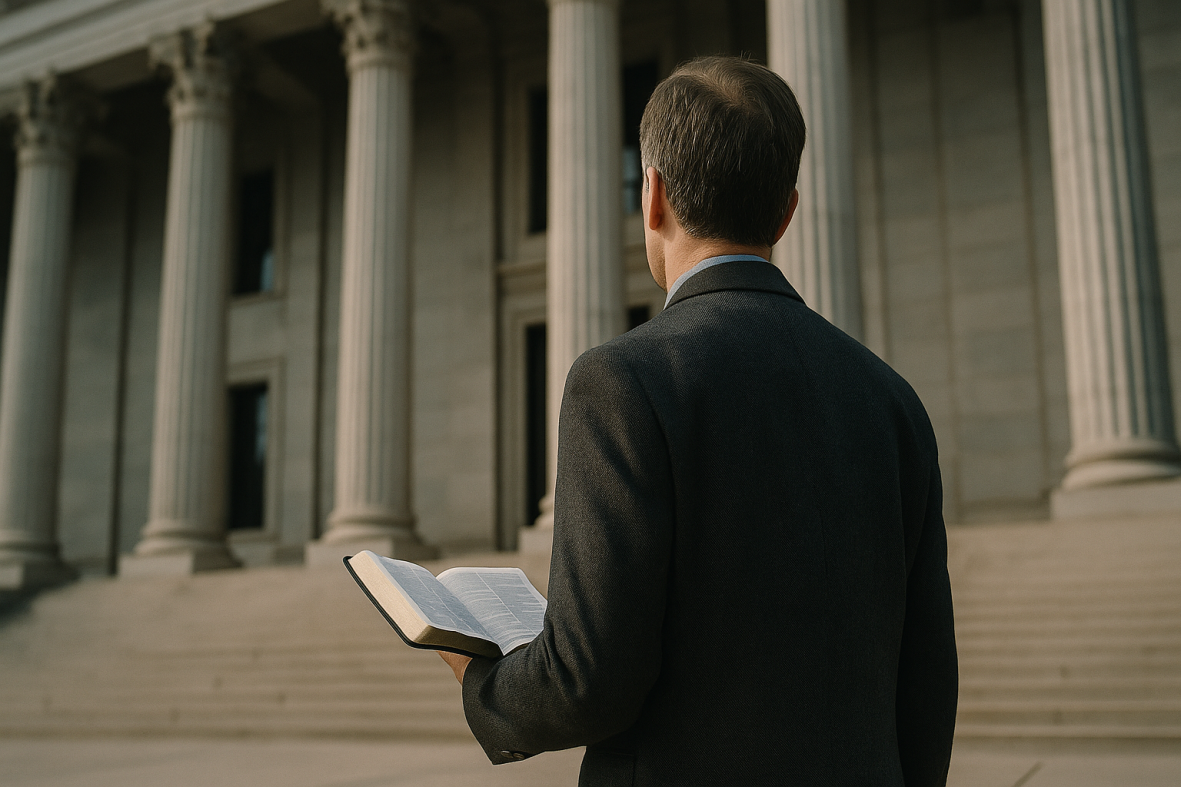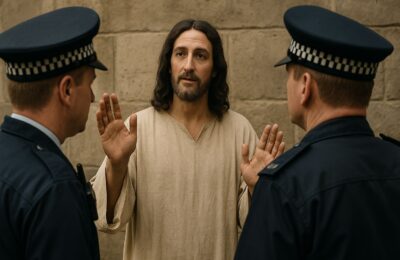Series: The Church and Public Policy
Scripture Focus: Acts 5:29
In April 1934, German pastors gathered in Barmen to draft a declaration. The Nazi regime was demanding not only loyalty but spiritual submission, attempting to fuse the church with the state. One voice among many, Dietrich Bonhoeffer, knew that giving in would mean betraying Christ. Their declaration affirmed: “Jesus Christ, as He is attested for us in Holy Scripture, is the one Word of God which we have to hear, and which we have to trust and obey in life and in death.”
The apostles faced the same pressure centuries earlier. Standing before the Sanhedrin, ordered to stop preaching Christ, Peter and the apostles replied with words that echo across history: “We must obey God rather than men” (Acts 5:29).
That is the heart of faithful disobedience. Government is ordained by God and worthy of honor, but it is not ultimate. When Caesar demands worship, when rulers intrude on conscience or forbid obedience to Christ, the Christian response must be clear. Obedience to God always comes first.
This is not rebellion for rebellion’s sake. It is not fueled by pride or politics. Faithful disobedience is an act of allegiance to the true King, a refusal to bend the knee to any rival throne.
So the question before us is simple yet costly: When the state crosses the line, are we ready to stand firm?
Acts 5 records the apostles standing before the highest Jewish council of their day. The Sanhedrin had already forbidden them to speak in the name of Jesus (Acts 4:18). Yet the apostles continued preaching the gospel, healing the sick, and filling Jerusalem with the name of Christ. Arrested again and placed on trial, Peter and the others spoke with unwavering conviction:
“We must obey God rather than men.” (Acts 5:29, LSB)
The Principle of Higher Allegiance
This single sentence establishes a principle that runs through all of Scripture: government has real authority, but it has limits. When civil rulers command what God forbids or forbid what God commands, the line is crossed. At that point, obedience to God takes precedence.
The apostles did not deny the legitimacy of the Sanhedrin’s role. They had previously submitted to arrest and trial without resistance. Their disobedience was specific: they refused to stop preaching Christ because silence would mean disobedience to the risen Lord’s commission (Matt. 28:19–20).
Biblical Precedents
This pattern is not new in Acts. The Hebrew midwives in Exodus 1 refused Pharaoh’s order to kill newborn sons, fearing God more than the king (Ex. 1:17). Shadrach, Meshach, and Abednego refused to bow to Nebuchadnezzar’s golden image, declaring, “We will not serve your gods or worship the golden image that you have set up” (Dan. 3:18). Daniel himself prayed openly to the Lord when prayer to any other but the king was outlawed (Dan. 6:10).
Each example shows faithful disobedience is not rooted in arrogance but in devotion to God’s commands. The believer cannot render to Caesar what belongs only to Christ (Matt. 22:21).
The Final Conflict
Scripture looks forward to a time when government will again demand worship. Revelation 13 describes the beast who compels the nations to bow and receive his mark. Those who refuse are marginalized, persecuted, and killed. Yet the faithful overcome “because of the blood of the Lamb and because of the word of their testimony” (Rev. 12:11). The call to obey God rather than men will be the dividing line of allegiance in the final days.
The Balance of Obedience and Resistance
Acts 5:29 does not invite Christians to resist every law they dislike or disobey rulers over minor grievances. The same Peter who defied the Sanhedrin later wrote: “Submit yourselves for the Lord’s sake to every human institution” (1 Pet. 2:13). Paul also urged believers to honor governing authorities (Rom. 13:1–7). Faithful disobedience is not a loophole for rebellion but a last resort when obedience to man directly contradicts obedience to God.
This is the biblical framework: Christians honor rulers as God’s servants, but when those rulers usurp God’s place, the believer’s allegiance is clear. Christ is King. Our obedience is to Him first, whatever the cost.
The tension between honoring government and obeying God is not confined to ancient history. It is a living issue in our own time.
In 2025, Texas Attorney General Ken Paxton urged public schools to lead students in reciting the Lord’s Prayer. His call was framed as a return to tradition, a way to strengthen moral foundations. Yet it immediately raised concerns about coercion. Who decides what prayer children should say? What happens to those who do not share the faith being imposed?
This is where Acts 5:29 sheds light. The problem is not with the Lord’s Prayer itself, which remains a beautiful and biblical model of communion with God. The problem is with the state compelling worship. Genuine prayer cannot be mandated by law; it must flow from faith. The moment Caesar dictates how or when people must pray, he steps into a realm reserved for Christ.
Some Christians may be tempted to welcome such initiatives as cultural victories. But Scripture calls us to discern carefully. Do we want children praying because their teacher tells them to, or because the Spirit of God convicts them? Do we want worship that is compelled by law, or devotion that is born of grace?
History warns us of the dangers. Constantine’s empire blurred church and state, producing nominal Christianity but often stifling genuine faith. Bonhoeffer’s Germany fused national loyalty with religious life, creating a false church that bowed to Hitler. In both cases, the result was compromised witness and suffering for those who refused to conform.
Faithful disobedience is not simply about saying “no” to unjust laws. It is about saying “yes” to Christ’s exclusive authority. When government commands worship or forbids obedience to God, believers must be clear: we must obey God rather than men.
The challenge for modern Christians is to avoid two extremes. On the one hand, we must not shrink from public faith, pretending that worship belongs only in private. On the other hand, we must not confuse state-sponsored religion with gospel power. Religious liberty is best preserved when Caesar governs justly and Christ alone governs worship.
Faithful disobedience begins long before the moment of crisis. Shadrach, Meshach, and Abednego did not suddenly discover courage when the furnace blazed before them. Their refusal to bow was the fruit of convictions already settled in their hearts.
For disciples today, the call is the same. We must decide in advance who we will obey. If we wait until pressure comes, compromise will feel easier than courage. But if our hearts are anchored in Christ, we will be ready to say with Peter, “We must obey God rather than men.”
Practically, this means cultivating three habits.
1. Strengthen your convictions now. Study Scripture deeply. Know what God commands and what He forbids. Vague faith produces shaky obedience.
2. Practice small acts of courage. Speak the name of Christ in ordinary conversations. Refuse to laugh at what dishonors Him. Obedience in small things prepares us for faithfulness in greater tests.
3. Embrace the cost of discipleship. Jesus warned that following Him would invite opposition (John 15:18–20). When we count the cost now, we will not be surprised when it comes due.
Faithful disobedience is not about being quarrelsome or defiant for its own sake. It is about loving Christ more than comfort, reputation, or approval. Courage flows from conviction, and conviction flows from communion with the Lord. The disciple who walks daily with Christ will be ready to stand when Caesar demands what belongs to God.
Faithful disobedience is not a theory to admire but a discipline to practice. The time to prepare is now, not when pressure arrives.
This week, take three steps:
- Settle your allegiance. Spend time in prayer, confessing to God that He alone is your King. Say it aloud. Let your heart hear your loyalty declared.
- Speak the name of Jesus. In one conversation this week, mention Christ naturally and without shame. Courage in ordinary moments strengthens courage in extraordinary trials.
- Study the faithful. Read the stories of Daniel, the apostles, or modern witnesses like Bonhoeffer. Let their example remind you that obedience is worth the cost.
The world will always have rulers who demand too much. But the disciple who belongs to Christ already knows the answer. Obedience to God comes first. Stand firm, speak boldly, and trust the Lord who honors those who honor Him.
Series Navigation
- Previous Post (Aug 12): The Role of Government in God’s Plan (Romans 13:1–2)
- Next Post (Aug 26): Voting with a Biblical Worldview (Jeremiah 29:7)
- View All: Facing the Issues: A Christian Worldview for a Confused Age
Takeaway Truths
- Government has limits. When rulers cross God’s commands, their authority ends at the line of conscience.
- Faithful disobedience is obedience to Christ. Refusing Caesar’s false claims is not rebellion but loyalty to the true King.
- Courage is cultivated daily. Conviction in small matters prepares believers to stand firm when the cost is great.
Live it out. Share the truth. Walk with courage.








